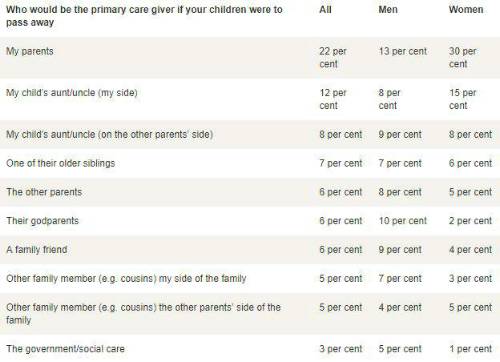Amongst those who have planned who would look after their children, almost a third (31 per cent) wouldn’t leave any money for their care, but instead put this into a trust
Family law practitioners say courts are most likely to grant custody of orphaned children to their grandparents
New research from Direct Line Life Insurance reveals almost two thirds (65 per cent) of parents have made no legal provision (e.g. writing into a will) for who would raise their children if they were no longer able to care for them.
Whilst it is difficult to discuss who might look after the children if both parents were to pass away, millions of parents (42 per cent) haven’t even broached the issue with their partner. Even when parents have discussed who should raise their children, 17 per cent could not agree who they should ask to take on the responsibility.
Almost a third (31 per cent) of those who have discussed making legal provision for potential guardians wouldn’t give the person raising their children access to any money from their estate, as many parents (30 per cent) would rather leave their estate in trust for their children, than leave money to the person providing their care.
When people were asked why they haven’t made legal provision for the care of their children, more than a third (36 per cent) say they hadn’t considered it, while 18 per cent didn’t want to think of dying and their own mortality. Almost a quarter (24 per cent) of people assumed their children would automatically be put into the care of their parents, or next of kin.
When it comes to who would look after the children if both parents were to pass away, most people would expect their own parents to take them in (28 per cent), while a fifth (20 per cent) would expect the child’s aunt or uncle to assume responsibility. Godparents may have been traditionally responsible for looking after their godchild in this situation, but changing religious and social trends mean just one in twenty (6 per cent) parents would expect godparents to take on this responsibility. Interestingly it appears it is the mother’s side that is most likely to be given custody of the children, with the mother’s parents ranking ahead of the father’s1.
Table One: Who would be the primary care giver if your children were to pass away

Source: Direct Line Life Insurance
Jane Morgan, Business Manager at Direct Line Life Insurance, commented: “Thinking about who would take care of their children if they were to pass away is a parent’s worst nightmare. However, difficult it is to contemplate, it is incredibly important to have a plan in place should the worst happen.
“To prevent a custody battle, parents should make a legal provision for those who would be primary carers for their children, ensuring they would be happy to take on the responsibility. While they may be happy to step in, some people may struggle with the financial implications of bringing up someone else’s child, so it is important to consider this too.
“Life Insurance offers an affordable way for families to help look after loved ones financially if someone passes away, paying out a lump sum, to help deal with every day money concerns such as household bills.”
Research amongst family law practitioners reveals that in the event both parents were to pass away and there is no previous legal provision made for the care of their children, the grandparents are most likely to be granted custody by the courts. However, social services are likely to be awarded custody in more than a third of cases (36 per cent), unless a family member petitions to care for the child.
When judges determine who should have custody of a child whose parents have passed away they apply several criteria. Family law professionals highlight that in their experience, living in the same area where the child was raised previously is most important, followed by having other children for them to socialise with. Legal professionals also highlight that the child’s preference is unlikely to be taken into account, as it is more important to consider the biological relationship to the custodian and their financial suitability.
|

